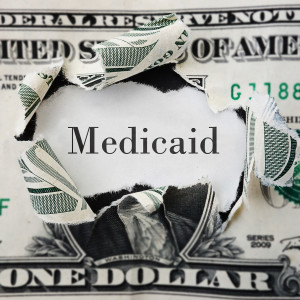Tuesday’s passage in the U.S. Senate of President Donald Trump’s One Big Beautiful Bill has New Hampshire’s all-Democratic federal delegation outraged.
“The Republican budget bill takes health care away from tens of thousands of Granite Staters, raises health premiums and other costs on all Americans, and saddles our children and grandchildren with trillions in debt in order to pay for tax giveaways for corporate special interests and billionaires,” said U.S. Sen. Maggie Hassan.
Much of the focus is on the bill’s Medicaid reform provisions, which U.S. Sen. Jeanne Shaheen says will “rip away healthcare from millions of Americans.”
But is it true? Does the GOP’s budget reconciliation bill “slash spending” on Medicaid as its critics in the Democratic Party contend?
For example, U.S. Rep. Maggie Goodlander claims, “This bill will cost lives. The GOP’s Big, Brutal Budget Bill makes the biggest cuts to healthcare in American history.”
“By some critics’ estimates, Republicans are cutting Medicaid by more than $1 trillion.”
According to the CBO, however, overall federal Medicaid spending is projected to grow by $204.6 billion—a 31.2 percent increase.
As The Wall Street Journal reported Tuesday, critics “are still screaming that the bill ‘cuts’ Medicaid, though it includes no changes to benefits and merely slows the pace of federal spending.”
Another key factor in the “biggest cut” argument is that Biden-era policies enabled 1.3 million individuals to enroll in the Medicaid program despite being ineligible. Moreover, the Affordable Care Act, signed into law under President Barack Obama, was the biggest expansion of Medicaid since the program’s inception in 1965.
Additionally, the allegation that the new bill will “rip healthcare from tens of thousands of Granite Staters” is a misleading reference to the CBO’s estimates of the impacts from Medicaid work requirements in the legislation. It predicts that about 4.8 million able-bodied adults will simply stop collecting Medicaid due to the “community engagement requirements.”
Another 1.4 million illegal aliens who are getting state-funded Medicaid are also expected to leave the Medicaid rolls. And more frequent eligibility reassessments will help remove people who no longer qualify for free healthcare from the rolls sooner.
A recent American Enterprise Institute study broke down how the average childless, nondisabled Medicaid recipient spends their time daily.
“For Medicaid recipients who do not report working, the most common activity after sleeping is watching television and playing video games,” the study found. “They spend 4.2 hours per day watching television and playing video games, or 125 hours during a 30-day month.
“That is more than 50 percent higher than the 80 hours they would be required to work or otherwise engage with the community during at least some months under the reconciliation bill.”
U.S. Rep. Chris Pappas claimed during the House debate of the legislation that Republicans were pushing it “all so people like Elon Musk — billionaires and the biggest corporations — can get a huge tax break.
But when Pappas and the rest of the delegation voted against the bill, they were voting to allow the Tax Cuts and Jobs Act of 2017 to expire at the end of the year. If that happens, the average New Hampshire family will be forced to cough up an additional $3,472 in federal taxes.
Both the House and Senate versions of Trump’s OBBB extend those cuts.
New Hampshire’s delegation also voted against increasing the current standard deduction, which was doubled in the 2017 tax cuts, and making the higher deduction permanent.
Beginning in 2025, the standard deduction increases by $1,500 for married couples and $750 for individuals. None of that happens if the OBBB fails.
That means the new standard deduction for 2025 would increase to $31,500 for married couples, $23,625 for heads of household, and $15,750 for single filers. Those amounts are adjusted for inflation thereafter.
Tax Relief for Families: Doubled Child Tax Credit Increased by $200 and Permanently Extended
A National Federation of Independent Business – New Hampshire study found the 2017 tax cut package’s small business deduction led to 6,000 new jobs in the Granite State.
Analysis from the Council of Economic Advisers (CEA) reports that keeping the 2017 TCJA tax rates will boost the level of long-run real gross domestic product (GDP) by 2.6 to 3.2 percent and raise annual real wages by $2,100 to $3,300 per worker.





